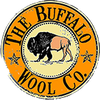S & D Spinning Mill, Millbury MA. - Part 1: A cornerstone of the American textile industry
The Dearnley Family has been running S & D Spinning since the 1800s. This is one of the last large scale wool mills left in the U.S. and they are absolutely crucial to us keeping our production here in the U.S. John and David are two of the five brothers that we deal with most and they are experts in textile construction and composition. A lot that goes into making exceptional quality socks, gloves, and hats. You can't make great products if you don't start with great materials and put them together properly. They really don't have a consumer-facing website, so I am going to do my best to tell their story here.

In order to make our yarns, the fiber needs to be blended properly. Bison down and preshrunk merino wool are weighed out and layered three floors above me here. They are sprayed with a water and mineral oil anti-static mixture, and fed into a big picker that blows them down the chute above me into the feed room here.

This is the first carding machine. Fiber is fed into the hopper and goes up a "ladder" into the card. It has a weighing mechanism that keeps the flow even and smooth.

Here is John Dearnley "stripping" a card. Carding cloth is cut wire that combs the fiber and gets everything aligned smooth and parallel before spinning it into yarn. Keeping these cards clean ensures that there is no fiber contamination from one batch to the next and makes sure everything comes out perfectly smooth.
John is probably the most knowledgeable person in the United States when it comes to constructing woolen yarns. How much twist is necessary to hold it together, make it durable and still give the maximum amount of loft to give it the best insulating properties. The proportions of different fibers. The diameter and length. All of these contribute to the equation. This is where art, science and knowing your equipment are all important. The lifetime of experience John possesses is invaluable.


Here we watch as the first pass of "web" comes through the first card. This equipment has been meticulously maintained and working pretty much since the early 1900s and while there is more modern equipment available, the cards and spinning frames at S&D have proven to be able to make exceptional quality yarns. Why change what works?

The fiber goes through quite a few steps in order to make it perfectly blended and parallel. Here it comes off the first card and is laid down perpendicular as it enters the second set of cards.


So, I have probably put way too many images in this post so far, and we really haven't shown half of the process. Maybe it is best if we continue this in the next one? Sorry to leave you hanging, but the best is yet to come. :)
Ron
(All images used in this post were taken by Jody Horton, one of the most amazing photographers we have met, you can see some of his other work here, the guy is phenomenal )


Thank you, BWC, for revealing the ‘behind the scenes’ reality of how these fibers are converted into whole fabrics for making beneficial clothing.
I am thankful for the Dearnley passion for this historic process and knowledge.
If it ain’t broke, don’t fix it!
Don’t change a thing about this process! This should be an historical location.
I thoroughly enjoyed learning about the Dearnley legacy.
Ron & T thank you both so much for sharing this. Another in a long series of this type. So interesting to see where and how our bison leather and fiber is made up for us consumers
Just bought three pair of Trekker socks to take with me deep sea fishing in Alaska. My feet are always cold in those rubber fishing boots and I am sure these socks will cure that. They are so nicely made. Thank you for the great story about the woolen mill.
Very interesting to read about the Dearnley brother’s natural fibers mill! I am glad this place still exists and I hope they are offering internships or some other incentive to get the next generation interested in and knowledgeable about processes like these so they can be continued on a commercial scale for future decades. Thank you for highlighting this family and this mill!
Just today I found your website, quite by accident! I love soft and warm wool products and am thrilled to discover your wide array of bison and mixed fiber products.
I am equally thrilled to see such high quality items still made from start to finish in the USA by highly dedicated and skilled craftspeople!
Thank you so much for your hard work and dedication to making these beautiful clothing items! There are still lots of people who value what you do!
Leave a comment